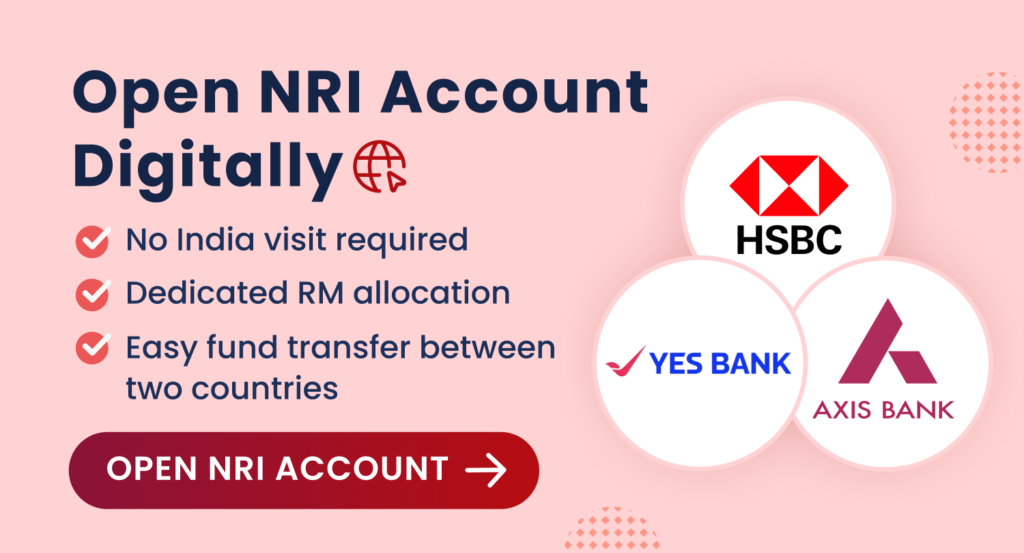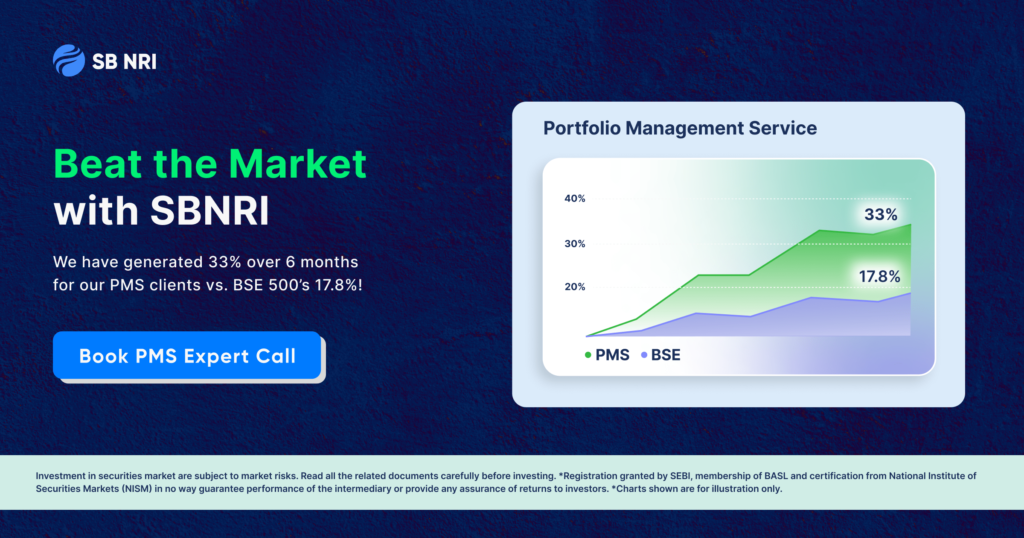
As the new year unfolds, it brings with it new opportunities for investors to make smart choices and build wealth. For Non-Resident Indians (NRIs) and Overseas Citizens of India (OCIs), navigating the global financial landscape requires a keen understanding of the best investment options. In this blog, we will explore five investment options for NRI/OCI investors can consider for a fruitful and diversified portfolio in the coming year.
5 Best Investment Options for NRI/OCI Investors 2024
1. Mutual Funds
Mutual funds pool investments from various investors and use the funds to invest in different investment avenues like equity, government securities, bonds, and more. Mutual funds can be one of the ideal investment options for NRIs/OCIs with limited knowledge and understanding of the Indian market as fund managers can make the investment decisions on behalf of the investors and allow NRI/OCI investors to achieve their goals.
Mutual funds can offer much higher returns than bank FDs and can be a good option to start your investment in India. There are several NRI mutual fund schemes in India for NRI investors. However, for NRIs from the US and Canada, there are a few compliance requirements under FACTA to be completed. Thus, only a select few AMCs offer mutual funds for NRIs based in the USA and Canada.
Also read:
10 Mutual Funds That Doubled Wealth In 5 Years
Best SIP to Invest in 2024 – Top 10 SIP Mutual Fund Plans for NRIs/OCIs

2. Fixed Deposits
Fixed Deposits are the most common investment options for NRIs/OCIs. FDs are one of the safe investment options for NRI in India to invest and earn fixed income over a predefined period. There are three types NRI Fixed Deposit Accounts:
- Non-Resident External (NRE) Account
- Non-Resident Ordinary (NRO) Account
- Foreign Currency Non-Resident (Bank) [FCNR(B)] Account
Let’s understand these NRI fixed deposit accounts:
- Non-Resident External (NRE) Fixed Deposit: NRE FD accounts are opened by NRIs to deposit their foreign earnings in Indian rupees. NRE FD account interest rate ranges from 2.75% to 7% p.a. The interest earned in an NRE account is tax-free in India but may be taxed in your country of residence. Both the principal as well as the interest earned can be fully repatriated.
- Non-Resident Ordinary (NRO) Fixed Deposit: NRIs can open an NRO Fixed Deposit account to maintain and save their income generated in India, such as dividends, rental income, pension, etc. You can earn up to a 7.30%* interest rate on these accounts. Interest earned on the funds is taxable in India at 30% along with surcharge and cess.
- Foreign Currency Non-Resident (Bank) [FCNR(B)] Fixed Deposit: An FCNR (B) fixed deposit account allows NRIs to deposit funds in a foreign currency in India, such as USD, GBP, EUR, JPY, AUD, CAD, SGD, HKD, and others. You can deposit money for different terms, like 12 months, 24 months, 36 months, 48 months, or 60 months. An FCNR account helps NRIs avoid currency fluctuation. FCNR FD interest rates vary based on the currency. The interest income is not taxable in India and both the principal amount and the interest are completely repatriable.

3. Commercial Real Estate
Real estate has been a traditional long-term investment option with the Indian diaspora. With new investment options like Commercial real estate becoming a prominent option, the investment options for NRIs/OCIs have increased multifold. Over 52 percent of NRIs are looking to invest in commercial real estate properties as a means of portfolio diversification and long-term wealth generation. NRIs/OCIs can invest in various commercial real estate properties and earn stable, high-yield, and risk-free returns.
Also read: Bhive Investment Review: Bhive Workspace & Bhive Alts Review
4. Portfolio Management Services (PMS)

Portfolio Management Services (PMS) allows NRI/OCI investors with high net worth to invest in the Indian equity market. Fund managers make the decisions on behalf of the investors and invest in the desired portfolio of stocks as per the investor’s investment goals and risk tolerance. NRI investors can invest in PMS with Rs 50 lacs and curate a tailored portfolio for themselves.
Also read: PMS for NRI: A Comprehensive Overview
Disclaimer: SBNRI is a distributor of portfolio management services offered by SEBI registered portfolio managers. SBNRI is facilitating your investment and any assistance provided by SBNRI shall not be considered as advice/ recommendation. SBNRI does not intend to predict the success of the strategies. You are advised to read related documents and independently determine its suitability to your goals & investment objectives.
5. National Pension Scheme
National Pension Scheme or NPS can be one more reliable source of investment for NRIs/OCIs in India. NPS scheme is fully backed by the government and allows NRIs to invest in equity funds, debts, or a combination of both.
Individuals between the ages of 18 years and 60 years can invest in NPS with minimal documents like a PAN card and an Aadhaar card. You need a Non-Resident External (NRE) account or a Non-Resident Ordinary (NRO) account when investing in NPS.
Other Noteworthy Investment Options for NRIs/OCIs
1. Public Provident Fund (PPF)
NRIs/OCIs can continue with his/ her PPF account which they opened as a resident Indian. However, if an NRI doesn’t have a PPF account, she/ he can’t apply for the same with non-resident status. NRIs can’t extend their PPF account after the maturity period of 15 years.
Wrapping Up
Navigating the investment landscape as an NRI/OCI requires careful consideration of the available options and a thorough understanding of one’s financial goals and risk tolerance. Diversifying across different asset classes can help mitigate risks and optimize returns. As we step into the new year, smart investing can pave the way for a secure and prosperous financial future for NRI/OCI investors.
India Investment Made Easy for NRIs/OCIs with SBNRI
NRIs can now download the SBNRI App and choose to invest in different NRI mutual fund schemes in India with ease. You can also get detailed mutual fund advice from experts at SBNRI. Also, visit our blog and YouTube channel for more details.
SBNRI is an authorized Mutual Fund Distributor platform & registered with the Association of Mutual Funds in India (AMFI). ARN No. 246671. NRIs willing to invest in mutual funds in India can download the SBNRI App to choose from 2,000+ mutual fund schemes or can connect with the SBNRI wealth team to better understand Mutual Fund investments.
Disclaimer: This blog has been written exclusively for educational purposes. The securities mentioned are only examples and not recommendations. It is based on several secondary sources on the internet and is subject to changes. Please consult an expert before making related decisions. SBNRI does not intend to predict future returns, please read all related documents before investing.
FAQs
Can NRI invest in mutual funds in India?
Yes. NRI can invest in mutual funds in India using their NRE/NRO bank account once they complete their Mutual Fund KYC.
How can NRI buy mutual funds in India?
NRI investors can purchase or sell mutual funds in India once they complete their Mutual Fund KYC and have an operating NRO/NRE Bank account.
Can NRI invest in property in India?
Yes. An NRI can invest in property in India but there are exceptions. Though RBI has given general permission to the NRIs to purchase immovable properties in India, the permission does not grant power to acquire any and every property in India. The NRIs are allowed to purchase only residential or commercial property. So NRIs cannot purchase any agricultural land or plantation property.
Can NRIs invest in PPF?
Yes, NRIs can have a Public Provident Fund (PPF) and invest in it. However, an NRI can open a PPF account when he/she was a resident Indian.
Are mutual funds a good long-term investment for NRIs?
Yes, mutual funds are a great long-term investment vehicle to generate returns and build wealth for NRIs. Investing in mutual funds for NRIs helps to utilize their savings and build wealth for the future. It also helps them to beat inflation and fulfill their investment goals.
Can NRI Invest in Retirement Mutual Funds in India?
Yes, NRIs can invest in mutual funds in India. It is one of the top investment options for NRI and can easily invest in different mutual fund schemes to generate higher returns and wealth building. The FEMA Act, RBI rules, and SEBI guidelines govern the rules and regulations regarding NRI investments in mutual funds which is why it has a slightly different procedure than that of resident individuals. However, it is very easy to set up your Mutual Fund KYC and link it to your NRO/NRE bank account to invest in mutual fund schemes in India.
What is a retirement fund, and how does it differ from other investment options?
A retirement fund is a specialized investment vehicle designed to help individuals save for their post-retirement years. It typically differs from regular investment options by focusing on a mix of assets tailored for long-term growth and income stability.
Can NRI invest in SIP in India?
Yes, an NRI can invest in India through the SIP route. SIP stands for Systematic Investment Plan.
How to make Rs 1 crore wealth from mutual funds in 10 years?
You can invest in a monthly SIP of Rs 43,100 for 10 years at an expected return of 12% to generate Rs 1 crore corpus at the end of 10 years. Based on the historical performance as aforementioned, the NIFTY 100 Index has provided 12.3% average annual return for the past 15 years.
How to make Rs 1 crore wealth from mutual funds in 15 years?
You can use the rule of 15x15x15 to make a wealth of Rs 1 crore from mutual funds in 15 years. With this rule of 15x15x15, you can invest Rs 15,000 a month for 15 years at an expected return of 15% and can generate Rs 1 crore (Rs 1.01 crore approx.) after 15 years.
Can I earn Rs 1 crore from mutual funds in 10 years?
Yes, you can earn Rs 1 crore from mutual funds in 10 years by investing in SIP on a monthly basis and become a crorepati from mutual funds.
Can NRIs become crorepati from mutual funds in 10 years?
Yes, NRIs can invest in various mutual fund schemes in India. If an NRI invests in a monthly SIP of Rs 43,100 over 10 years at an expected return of 12%, they will have a corpus of Rs 1 crore at the end of 10 years. Based on the historical performance as aforementioned, the NIFTY 100 Index has provided 12.3% average annual return for the past 15 years.
Can NRIs become crorepati from mutual funds in 15 years?
Yes, NRIs can become crorepati from mutual funds in 15 years by following the rule of 15x15x15 and investing Rs 15000 a month in SIP for 15 years with an expected rate of return of 15%, then they will become crorepati after 15 years with a wealth corpus of Rs 1 crore.



